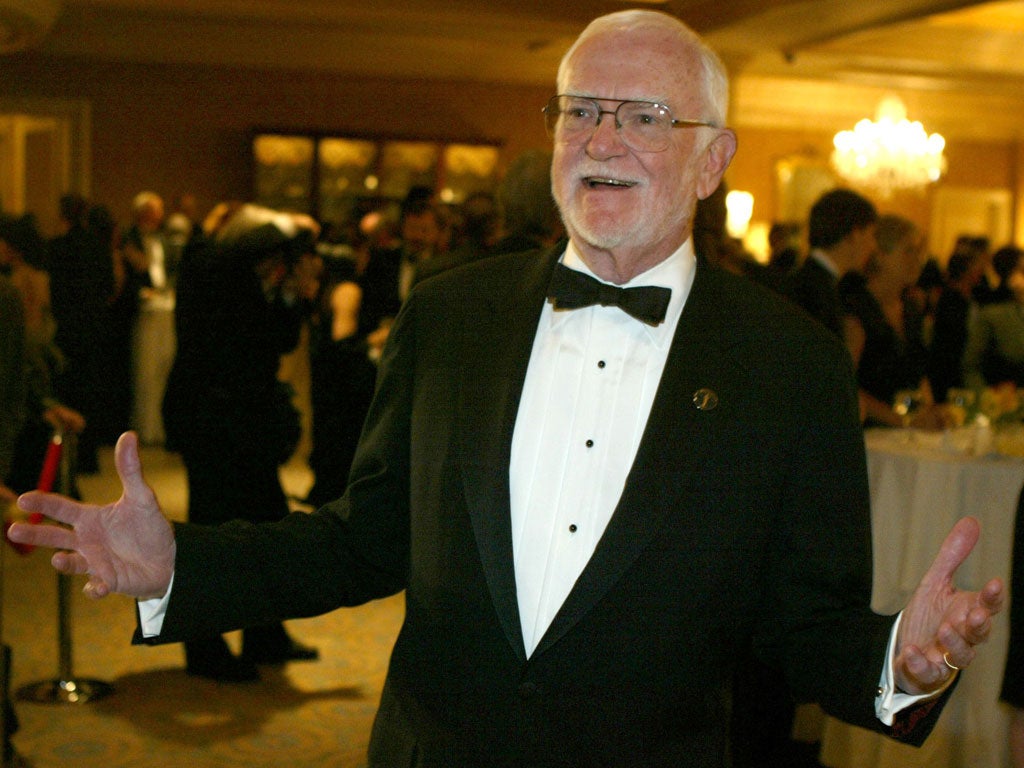Frank Pierson: Writer and director who won an Oscar and two Emmys
His later career was notable for his work dealing with episodes in the history of America

Your support helps us to tell the story
From reproductive rights to climate change to Big Tech, The Independent is on the ground when the story is developing. Whether it's investigating the financials of Elon Musk's pro-Trump PAC or producing our latest documentary, 'The A Word', which shines a light on the American women fighting for reproductive rights, we know how important it is to parse out the facts from the messaging.
At such a critical moment in US history, we need reporters on the ground. Your donation allows us to keep sending journalists to speak to both sides of the story.
The Independent is trusted by Americans across the entire political spectrum. And unlike many other quality news outlets, we choose not to lock Americans out of our reporting and analysis with paywalls. We believe quality journalism should be available to everyone, paid for by those who can afford it.
Your support makes all the difference.Often adapting existing material, the writer and director Frank Pierson collected three Oscar nominations, with his script for Dog Day Afternoon delivering a statuette. He also collected two Emmys for directing. As well as films revolving around either crime or show-business he directed several studies of important moments in American history.
After war service Pierson studied cultural anthropology at Harvard and became a journalist for magazines including Time, Life and others. Meanwhile he wrote scripts on spec and in 1959 began a four-year association with the western television series Have Gun – Will Travel, graduating from story editor, through writer to director and producer.
Pierson's break into film came with the comedy-western Cat Ballou for which he and Walter Newman shared an Adapted Screenplay Oscar nomination. Roy Chanslor's novel had defeated several writers until Newman had the idea of making it into a comedy but, bored, he created the outline structure and left Pierson to write it. In 1967 Pierson shared an Oscar nomination with novelist and former inmate Donn Pearce for the chain-gang drama Cool Hand Luke, capturing the character's self-destructive pride. The same year he scripted The Happening, a hipster drop-out comedy about a kidnapping that goes wrong.
Pierson moved into directing in 1969, overseeing his adaptation of John le Carré's The Looking Glass War. Among the many changes – some to try to appeal to a younger audience – one was forced, as Paramount owned the character rights to George Smiley. In 1971 Pierson created the TV series Nichols about a disillusioned soldier's return home to 1914 Arizona.
Pierson had greater success scripting Sidney Lumet's heist movie The Anderson Tapes, whose fascination with surveillance presaged several conspiracy thrillers. His Oscar came for Lumet's Dog Day Afternoon (1975), which tapped into post-Vietnam anti-establishment feeling. It was based on a Life magazine article about a heist that the robber hoped would pay for his lover's sex-change operation but which degenerates into a siege, although the robbers develop a camaraderie with the bank staff and, for a while, have public sympathy. However, it inevitably ends badly. The story rights helped pay for the operation but the surviving robber wrote to the New York Times pointing out some of the factual errors.
The following year Pierson climbed back into the director's chair for a rock-remake of A Star Is Born. His article "My Battles with Barbra and Jon" described his struggle with the film's star, Barbra Streisand and the producer, her then boyfriend Jon Peters, as they constantly attempted to wrestle control from everyone. Still, Pierson didn't spare his own blushes and pays tribute where appropriate.
The last cinema film Pierson directed was King of the Gypsies (1978), a study of criminal and violent New York gypsies. But his screenwriting and TV directing careers continued as successfully as ever. His script for Haywire (1980) was based on the tragic life of the actress Margaret Sullavan, based on her daughter Brooke Hayward's memoir.
Back with crime, his adaptation of Scott Turow's Presumed Innocent (1990) was efficiently directed by Alan J Pakula and starred Harrison Ford as a DA implicated in the death of a colleague and former lover, and struggling to prove his innocence.
In the early 1990s Pierson directed several impressive TV movies on American history, garnering various awards and nominations. Citizen Cohn (1992), starring James Woods, is a biopic of Roy Cohn, the infamous red-scare lawyer and McCarthy's right-hand man. As he lies in hospital, dying of Aids, his hallucinations track his entire life.
Lakota Woman: Siege at Wounded Knee (1994), based on a Sioux woman's memoir, follows her struggle to learn about and publicise the 1890 massacre. Gary Sinise played the wartime President in Truman (1995), while 2000's Dirty Pictures, again starring Woods, recreated the storm that surrounded Robert Mapplethorpe's sadomasochistic photographs.
Moving outside America, Conspiracy (2001) recreated the Wannsee Conference that initiated the Nazis' policy of final solution, with Kenneth Branagh as Heydrich. Pierson ended his career back on serial TV, as consulting producer and occasional writer on the high-end dramas The Good Wife and Mad Men.
Pierson was recognised with numerous industry awards and served in various capacities at the Writers' Guild of America, the Sundance Institute and the American Film Institute. As a teacher he was keen to counter what he felt was the lack of ambition and falling quality of scripts and the decreasing cine-literacy of writers, who had no grasp of the full range of film history. In 2001 he began a four-year term as President of the Academy of Motion Picture Arts and Sciences.
Frank Romer Pierson, screenwriter, director and producer: born Chappaqua, New York 12 May 1925; married 1948 Polly Stokes (marriage dissolved; one son, one daughter), 1978 Dori Derfner (marriage dissolved), 1990 Helene; died Los Angeles 22 July 2012.
Join our commenting forum
Join thought-provoking conversations, follow other Independent readers and see their replies
Comments